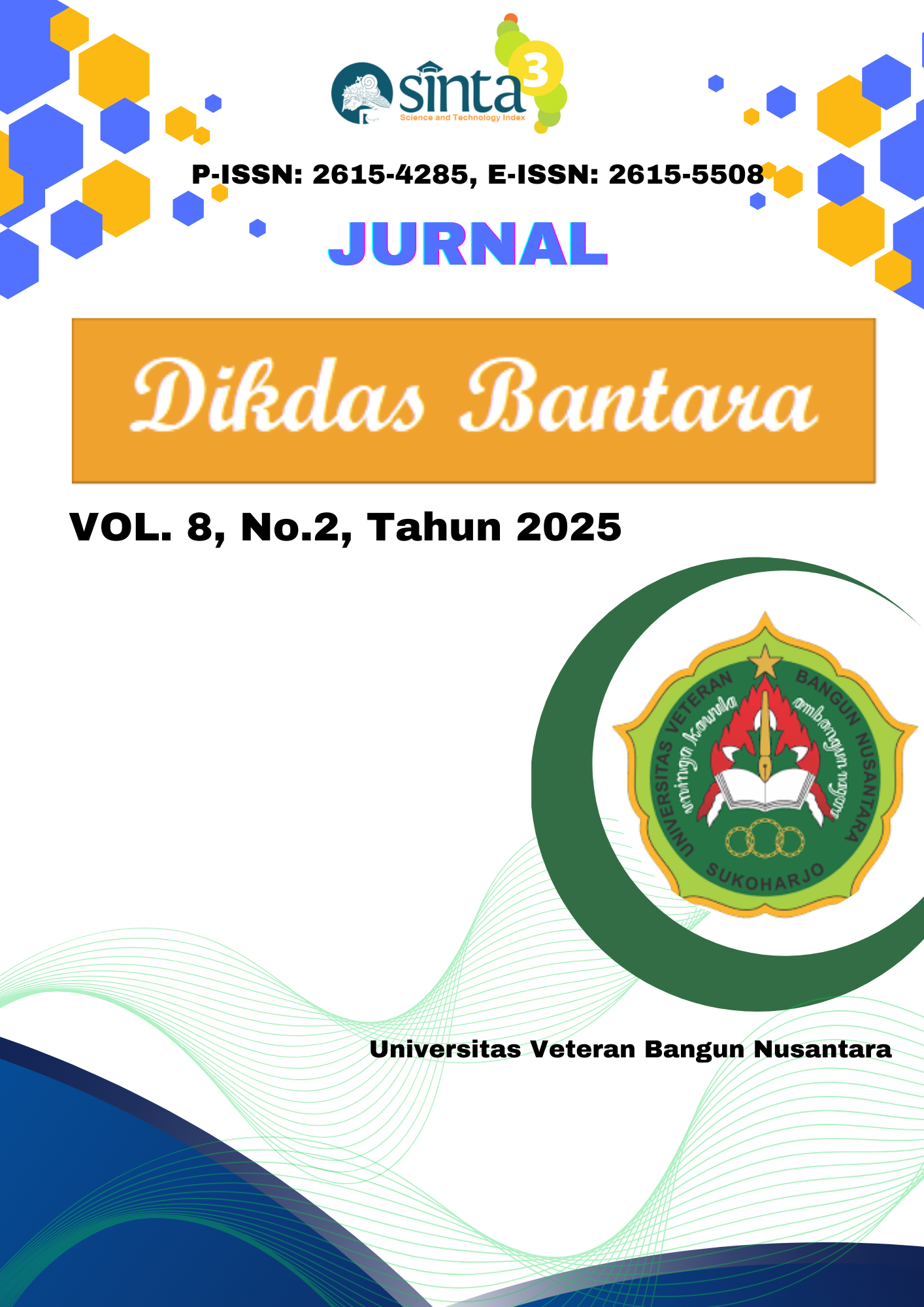IMPLEMENTATION OF REALISTIC MATHEMATICS EDUCATION (RME) IN FRACTION LEARNING TO IMPROVE ELEMENTARY SCHOOL STUDENTS' CONCEPTUAL UNDERSTANDING
DOI:
https://doi.org/10.32585/dikdasbantara.v8i2.7169Abstract
Mathematics learning in elementary schools often faces challenges in improving students' conceptual understanding, especially in fractions. A fifth-grade teacher at Sd Negeri 61 Banda Aceh City, Mrs. N, said in an interview session that during the teaching and learning process in the classroom, teachers still tend to use lecture methods as is generally used so that the teaching and learning process in the classroom is conventional and lacks creativity during learning, students are unable to implement it into real life. The Realistic Mathematics Education (RME) approach provides a solution by connecting mathematical concepts with real-life contexts, making it easier for students to understand and apply fraction concepts more meaningfully. This study aims to analyze the implementation of the RME model in fraction learning and its effect on elementary school students' conceptual understanding. The research method used is a quasi-experimental study with a pretest-posttest control group design. The research subjects consisted of fifth-grade elementary school students who were divided into an experimental group (with RME) and a control group (with conventional methods). The research instruments included conceptual understanding tests, observations, and interviews to obtain quantitative and qualitative data. The results showed that students who learned with the RME approach experienced a more significant increase in conceptual understanding compared to students who learned using conventional methods. RME-based learning can help students construct fraction concepts through exploration of contextual situations, group discussions, and reflection on problem-solving strategies. Therefore, using this approach can be an effective strategy in improving the quality of fraction learning in elementary schools.
Downloads
Downloads
Published
Issue
Section
License
Copyright (c) 2025 Rita Yusari , Rita Novita, Syarfuni, Siti Mayang Sari

This work is licensed under a Creative Commons Attribution-ShareAlike 4.0 International License.
The copyright to this article is transferred to Jurnal Dikdas Bantara if and when the article is accepted for publication under Creative Commons Attribution-ShareAlike 4.0 International License. The undersigned hereby transfers any and all rights in and to the paper including without limitation all copyrights to Jurnal Dikdas Bantara. The undersigned hereby represents and warrants that the paper is original and that he/she is the author of the paper, except for material that is clearly identified as to its original source, with permission notices from the copyright owners where required. The undersigned represents that he/she has the power and authority to make and execute this assignment.We declare that:
1. This paper has not been published in the same form elsewhere.
2. It will not be submitted anywhere else for publication prior to acceptance/rejection by this Journal.
3. A copyright permission is obtained for materials published elsewhere and which require this permission for reproduction.
Furthermore, I/We hereby transfer the unlimited rights of publication of the above-mentioned paper in whole to Jurnal Dikdas Bantara. The copyright transfer covers the right to reproduce and distribute the article, including reprints, translations, photographic reproductions, microform, electronic form (offline, online), or any other reproductions of similar nature. The corresponding author signs for and accepts responsibility for releasing this material on behalf of any and all co-authors. After submission of this agreement signed by the corresponding author, changes of authorship or in the order of the authors listed will not be accepted.
Retained Rights/Terms and Conditions
1. Authors retain all proprietary rights in any process, procedure, or article of manufacture described in the work.
2. Authors may reproduce or authorize others to reproduce the work or derivative works for the author’s personal use or for company use, provided that the source and the Jurnal Dikdas Bantara copyright notice are indicated, the copies are not used in any way that implies Jurnal Dikdas Bantara endorsement of a product or service of any employer, and the copies themselves are not offered for sale.
3. Although authors are permitted to re-use all or portions of the work in other works, this does not include granting third-party requests for reprinting, republishing, or other types of re-use.



















